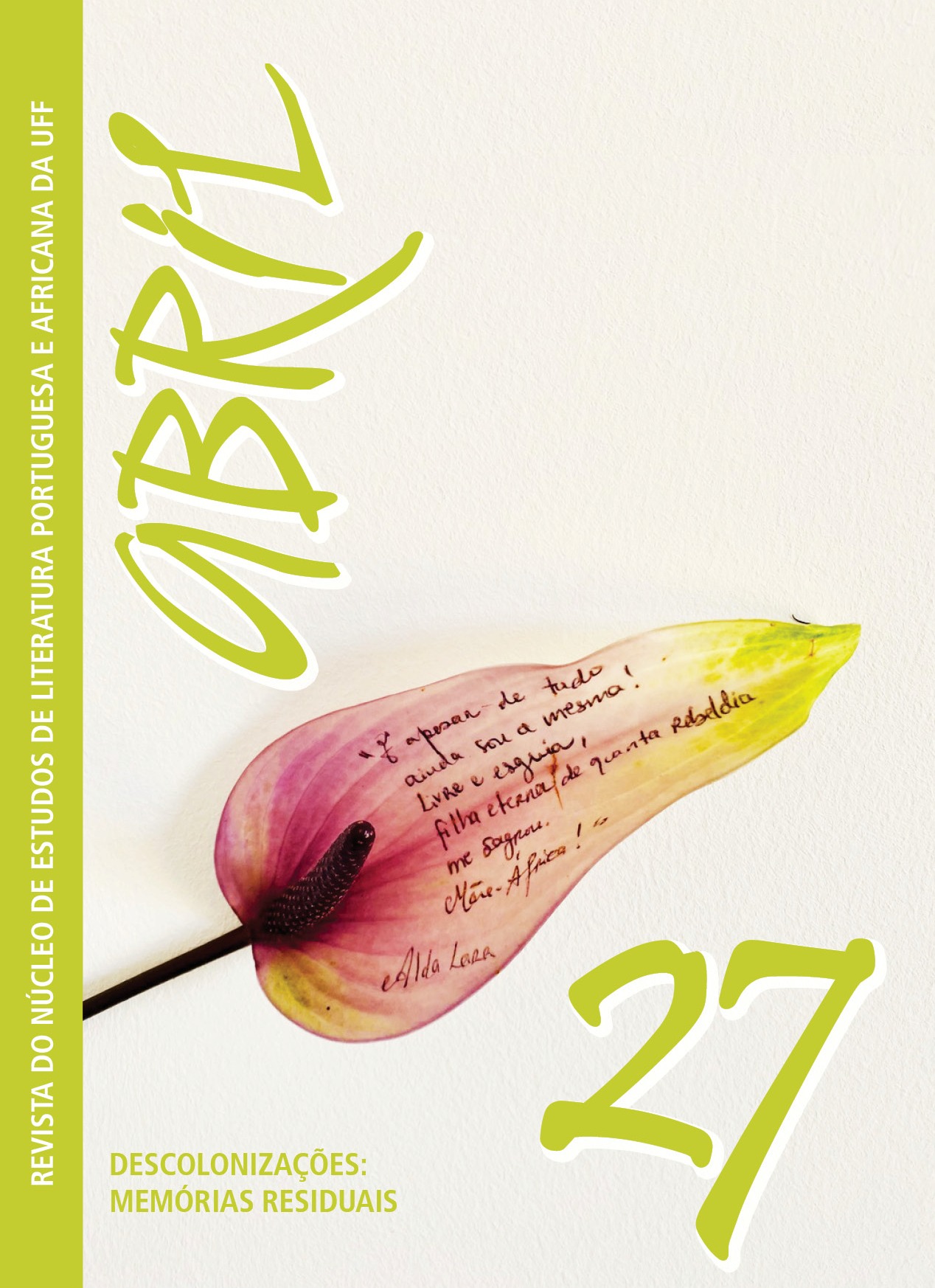Memory’s ransom: silences, postmemory, cinema
DOI:
https://doi.org/10.22409/abriluff.v13i27.51241Palavras-chave:
Pós-memória, Filme, Silêncio, Revolução, Guerra ColonialResumo
Close to half a century after their end, the colonial wars Portugal waged in a desperate and doomed attempt to hold on to its African colonies in 1974 remain still largely unprocessed. This article examines the multiple silences surrounding the colonial wars and the 25th April Revolution in Portugal drawing from the concept of postmemory and the notion of a traumatic past whose wounds have never healed. It argues that silence in the end does nothing more than allow those open wounds to go on festering. The combined silence over the dictatorship and the colonial wars was never more than a mild palliative, yet another self-delusion the nation allowed itself as it attempted to put on its new European costume. The article focuses on two films, Inês de Medeiros’ Cartas a uma Ditadura (2006) and Ivo M. Ferreira’s Cartas da Guerra (2016), their differences and their similarities, singling out the work of postmemory evident in the scenes with Belmira Monteiro and her granddaughter in the former.
------------------------------------------------------------
O RESGATE DA MEMÓRIA: SILÊNCIOS, PÓS-MEMÓRIA, CINEMA
Passados quase cinquenta anos depois do seu fim em 1974, as guerras coloniais que Portugal travou em África numa tentativa desesperada e condenada ao fracasso de assegurar o domínio das suas colónias, continuam ainda por processar devidamente. Este artigo examina os silêncios múltiplos ao redor das guerras coloniais e da Revolução de 25 de Abril em Portugal a partir do conceito de pós-memória e da noção de um passado traumático cujas chagas nunca sararam. Avança a sugestão de o silêncio manter essas feridas em aberto. O silêncio combinado que recaiu sobre a ditadura e as guerras coloniais nunca foi mais que um paliativo suave, mais uma das ilusões que a nação se permitiu para melhor vestir o seu novo traje Europeu. Este artigo debruça-se sobre dois filmes, Inês de Medeiros’ Cartas a uma Ditadura (2006) e Ivo M. Ferreira’s Cartas da Guerra (2016), as suas diferenças e semelhanças, salientando o trabalho de pós-memória evidente nas cenas do primeiro em que Belmira Monteiro figura com a sua neta.
---
Original em inglês.
Downloads
Referências
BOTELHO, JOÃO. Realizador. Um Adeus Português. Portugal, Produções OFF, 1985. DVD, Zon Lusomundo, 2008.
CARDOSO, MARGARIDA. Realizadora. A Costa dos Murmúrios. Portugal: Filmes do Tejo et al. DVD. Atalanta Filmes, 2004.
CÂMARA, VASCO. “Cartas da Guerra. Um filme que se ergue”. Ípsilon, Público 1 de Setembro de 2016. https://www.publico.pt/2016/08/24/culturaipsilon/critica/nao-e-voz-off-e-voz-in-a-procura-de-um-lugar-out-1742132.
COPPOLA, FRANCIS FORD. Realizador. Apocalypse Now. United Artists and Zoetrope, 1979.
DE MENESES, ALISON RIBEIRO. “Affect and the archival turn: Documentaries by Inês de Medeiros and Susana de Sousa Dias”. Women’s Cinema in Contemporary Portugal.
LIZ, MARIANA e OWEN, HILARY (Orgs.), New York: Bloomsbury Academic, 2020, pp. 150–168.
ENCARNACION, OMAR G. “History, Politics, and Forgetting in Spain”. Democracy Without Justice in Spain. Philadelphia: University of Pennsylvania Press, 2014. pp. 27-49.
FAULKNER, WILLIAM. Requiem for a Nun, London: Vintage, 2015.
FERREIRA, ANA PAULA. “Home Bound: The Construct of Femininity in the Estado Novo”. Portuguese Studies 12, 1996, pp. 133-144.
FERREIRA, IVO M. Realizador. Cartas da Guerra. Portugal: O som e a fúria, 2016. DVD: Alambique.
FOUCAULT, MICHEL. The History of Sexuality. Volume 1: An Introduction. Tradução: Robert Hurley. New York: Pantheon Books, 1978.
HIRSCH, MARIANNE. The Generation of Postmemory: Writing and Visual Culture After the Holocaust. New York: Columbia University Press, 2012.
HUYSSEN, ANDREAS. Present Pasts: Urban Palimpsests and the Politics of Memory. Stanford: Stanford University Press, 2003.
JAMESON, FREDRIC. Valences of the Dialectic. London: Verso, 2009.
JORGE, LÍDIA. A Costa dos Murmúrios. Lisboa: Dom Quixote, 1988.
LOBO ANTUNRES, ANTÓNIO. Memória de Elefante. Lisboa: Editorial Vega, 1979.
LOBO ANTUNES, ANTÓNIO. Os Cus de Judas. Lisboa: Editorial Vega, 1979. The Land at the End of the World. Tradução: Margaret Jull Costa. New York: W. W. Norton & Co., 2012).
LOBO ANTUNES, ANTÓNIO. D’este viver aqui neste papel descripto. Cartas da guerra. Eds. Maria José Lobo Antunes and Joana Lobo Antunes, Lisboa: Edições Dom Quixote, 2005.
LOFF, MANUEL. “Coming to Terms with the Dictatorial Past in Portugal after 1974: Silence, Remembrance and Ambiguity”. SACHSE, CAROLA and WOLFRUM, EDGAR (Orgs.). Diktaturen und ihre Überwindung im 20. Und 21. Jahrhundert. Vol. 5: Postdiktatorische Geschichtskulturen im Süden und Osten Europas. Bestandsaufnahme und Forschungsperspektiven. TROEBST, STEFAN (Org.) with contribution by BAUMGARTL, SUSAN. Göttingen: Wallstein Verlag, 2010. pp. 55-121.
MEDEIROS, INÊS DE. Realizadora. Cartas a uma ditadura. Portugal, Faux, 2006. DVD.: Alambique.
MEDEIROS, PAULO DE. “Until the End of the World”. Bulletin of Hispanic Studies 85, 2008, pp. 201-213.
MEDEIROS, PAULO DE. “Herança de sombras. Memória, Pós-Memória e Responsabilidade em ‘Os Memoráveis’ de Lídia Jorge”. Colóquio-Letras 205: 2010, pp. 79-97.
MEDEIROS, PAULO DE. “Post-imperial Nostalgia and Miguel Gomes’ Tabu”. Interventions, 18:2, 2016, pp. 203-216.
OLIVEIRA, MANOEL DE. Realizador. Non, ou a Vã Glória de Mandar. Portugal, Madragoa Filmes et al., 1990.
NAGIB, LUCIA. “Colonialism as Fantastic Realism in Tabu”. Portugal’s Global Cinema. LIZ, MARIANA (org.). London: Bloomsbury, 2018, pp. 223-238.
RIBEIRO, MARGARIDA CALAFATE. “A Casa da Nave Europa – miragens ou projeções pós-coloniais?” Geometrias da memória: configurações pós-coloniais. RIBEIRO, ANTÓNIO SOUSA e RIBEIRO, MARGARIDA CALAFATE (Orgs.). Porto: Afrontamento, 2016. pp. 15-42.
SARLO, BEATRIZ. Tiempo Pasado: Cultura de la memoria y giro subjetivo. Una discusión. Buenos Aires: Siglo XXI Editores, 2005.
SOUTO, MARIANA. “Susana de Sousa Dias and the ghosts of the Portuguese dictatorship”. Comparative Cinema. Vol. III, 6, 2015, pp. 46-49.
VARELA, RAQUEL. A People’s History of the Portuguese Revolution. Tradução: Sean Purdy. London: Pluto Press, 2019.
Downloads
Publicado
Edição
Seção
Licença
Copyright (c) 2021 Abril – NEPA / UFF

Este trabalho está licenciado sob uma licença Creative Commons Attribution-NonCommercial 4.0 International License.
Autorizo a Revista Aabril - NEPA/UFF a publicar o artigo que ora submeto, de minha autoria/responsabilidade, caso seja aceito para publicação online. Declaro, ainda, que esta contribuição é original, que não está sendo submetida a outro editor para publicação, e assino a presente declaração como expressão da verdade.
Os trabalhos publicados no espaço virtual da Revista Abril serão automaticamente cedidos, ficando os seus direitos autorais reservados à Revista Abril. Sua reprodução, total ou parcial, é condicionada à citação dos autores e dos dados da publicação.

A Revista Abril utiliza uma Licença Creative Commons - Atribuição-NãoComercial 4.0 Internacional (CC BY-NC 4.0).









